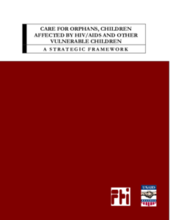The report Care for Orphans, Children Affected by HIV/AIDS and Other Vulnerable Children provides a strategic framework to assist national and local planners, implementers, and donors in setting program priorities. It also outlines the steps necessary to develop responsive care and support programs for orphans, children affected by AIDS and other vulnerable children. And finally, it elaborates on the role that FHI can play in this effort.
The global HIV/AIDS pandemic has been changing human lives and the shape of societies for more than 15 years in the heavily infected countries of Sub-Saharan Africa, Asia, Latin America and the Caribbean. It has reversed decades of development gains in health, and slowed economic and social improvement across the board and in ways that will change relationships at family, community and national levels forever.
One measure of the massive social change still to come is the number of orphans, children affected by HIV/AIDS, and other children made vulnerable by the pandemic. According to revised 2000 estimates, there are currently 34.7 million children under age 15 in 34 countries who have lost their mother, father, or both of their parents to HIV/AIDS and other causes of death. By 2010, that number will be 44 million. Without AIDS, the total number of children orphaned would have declined by 2010 to less than 15 million. In 2010, 20 percent to 30 percent of all children under 15 will be orphaned in 11 Sub-Saharan African countries, even if all new infections are prevented and some form of treatment is provided to slow the onset of AIDS in those infected with HIV (Children on the Brink 2000).
The human and social costs these estimates represent are staggering. Although the overwhelming majority of orphans and vulnerable children are living with surviving parents or extended family, many of them are being cared for by a remaining parent who is sick or dying, elderly grandparents who themselves are often in need of care and support, or impoverished relatives struggling to meet the needs of their own children. Children living in these situations are at increased risk of losing opportunities for school, health care, growth, development, nutrition, and shelter; in short, their rights to a decent and fulfilling human existence. Moreover, with the death of a parent, children experience profound loss and a heavy burden falls to the surviving parent. If the second parent also dies, all aspects of that child's world are threatened. Studies in many countries find that families and communities will absorb orphaned and affected children as long as their resources are sufficient. When the family and community capacity to absorb children has been reached, increasing numbers of children must look after themselves. Often the eldest child takes responsibility as the head of the household. Some of these children are left with no other option than to live on the streets, exposing them to even greater medical, social, and psychological difficulties.
©Family Health International

